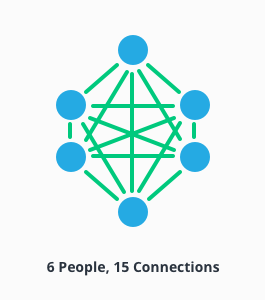
4 Truisms on the Importance of Hiring Well
People are the highest stake investment you can make. Get it right, and you add value, productivity and innovation to your company. Get it wrong, and a bad hire quickly leads to a waste of time, money and resources.
With such pressure, it's no wonder that it takes hiring managers an average of 42 days to fill a position.
Here are some truisms to keep in mind about the importance of hiring well.
1
Hiring is going to cost, bad hiring is going to cost more
When it comes to adding a new person to the team, there is no way around it: it costs to interview, background check, and train every new person you hire. In fact, it costs about $4129 per hire .
However, hiring someone that is a bad fit for the position or company is much more expensive. Ineffective hiring costs $17000 on average per bad hire. A poor fit is a costly mistake.

Obviously, salary is a huge loss when employees aren't pulling their weight. The cost of the hiring process and training is also lost when it turns out that someone cannot or will not fulfill their job.
Beyond the straight-forward loss of money, there are other indirect costs. Time is an extremely valuable commodity and bad hires quickly take all of it. The time wasted to get the person hired and trained cannot be recovered. There is also the time it takes to find out someone is a bad fit for the job, whether days, weeks or months.
A bad hire also absorbs incredible amounts of energy. It takes energy and concentration to fix a bad hire, either through correcting or firing, that could be directed elsewhere in a growing company. Their bad energy in the office can damage morale and productivity amongst others, which is deadly for company culture.
Hiring is an inflexible investment: meaning, it can’t be turned on or off, like Adwords, for example. Much like getting on an airplane or train, you are stuck until the journey ends. Once a bad hire has been made, there is no backing out. Either through correction, reassignment or firing, there is no easy way of fixing it.
2
Hiring is always personal
As much as we may want to be, there is no purely rational person and our emotions will always come into play in whatever decisions we make. The hiring process is no exception. It is nearly impossible to judge people rationally. Even when you are unhappy with someone’s work, you may have come to like them and want them to succeed despite all the obvious signs that they will not. Sometimes it is the other way around and their work may be flawless, but you simply cannot get along or like them.
Although many may seek to separate their personal from their professional lives, it simply is not possible all of the time and any person will always bring personal issues with them. Everybody has history, sensitivities in one way or another and many people are battling psychological issues. All of these will come into play when trying to screen and hire a candidate.
This is when other hiring mechanisms are vital to the vetting process. Background checks and references give you a sense of their character and proven track-record. Including more than one person in the interview, or having multiple interviews that include different people in the process, is essential. How does everyone feel about the candidate? It is important to get a consensus and not to necessarily rely on one person’s opinion on who to add to the company.

Looking for better customer relationships?
Test Userlike for free and chat with your customers on your website, Facebook Messenger, and Telegram.
Read moreSome companies also rely on questionnaires that pinpoint emotional intelligence and character. Although not absolutely necessary, they can be extremely useful in screening a candidate in a way that takes emotion and social convention out of the process.
There are some that may interview well, but lack the proper skill or character that is necessary for the position. Corporate sociopaths can take advantage of the emotional aspects of hiring, so it is important to have the other mechanisms in place. Although they may answer questions the right way, weed out the ones who will only suck up to authority while undermining their equals and subordinates.
3
Team complexity grows exponentially
Growing and expanding as a company company is exciting, but there are growing pains in the process. In the beginning, hiring a generalist is necessary. You need someone who can do a little bit of everything to help the company run smoothly, so one- person departments, and even one person handling several departments, are critical.
However, as your company grows there is need for specialization and specific skill-sets. Experts who are well-trained and qualified for very specific positions will need to replace the jack-of-all-trades that formerly filled them.
This makes the hiring process transitional, and you learn to look for specific training and experience in one field rather than someone who can do a little of everything. As your company grows, many will find this transition difficult. They need to learn to adjust and acquire new skills, or become obsolete.
Every team member that is added to a company, especially initially, creates a new layer of complexity. Even a few added employees creates exponential connections and complications will arise as a result. As your company grows and your team becomes overwhelmed, question whether another person is truly needed. See first if processes could be improved or streamlined before adding the intricacy of another employee, which may mean more connections, meetings, and problems.


As your company grows larger, more effective systems and policies need to be put in place. To keep up with growth and a changing environment, transparency must be encouraged. This uncovers any unhelpful patterns and helps the company run more smoothly. In addition, watch out for any needless authority and redundant processes in order to save time, encourage productivity and drive innovation.
None of these aspects of your company culture will happen by accident. Official processes and policies must be in place to encourage a healthy and open environment. The larger the company, the more intentionality required.
4
Your company shapes your hiring and hiring shapes your company
People and culture are symbiotic: this idea was recently popularized by Ray Dalio’s Principles about the driving standards behind his $160 billion hedge fund management company. Symbiosis is an interdependent relationship, and Dalio was underscoring the idea that the culture shapes the people, while the people shape the culture.

How does this play out in creating a positive company culture? The first part is building a company culture that attracts people. The needs of the average worker swiftly changed as Millennials entered the workforce and many businesses fail to attract young and eager workers as a result. Millennials are not just looking at the pay and benefits; they want a supportive and transparent environment that delegates and encourages responsibility instead of micromanaging. They want to be given opportunities for growth and expansion.
The new generation of workers look at the culture of your workplace beyond all else. Build a culture that encourages responsibility and gives ample opportunities, and you will find many flocking to work for your company.
The second part of this symbiosis is to keep a company culture by hiring the right people. A bad hire is toxic and will wreak havoc on your organization. In order to keep a company culture intact, hire those who will uphold its values.
This is when the issue of character becomes paramount in the hiring process. Character is just as important as education and experience when it comes to finding the right hire. In some cases, it is even more important. Many skills can be taught to the right person, but character is ingrained. Find out during the interview and vetting process what their motivation is and what they look to get out of their job. Look for those who are attracted to and will uphold the culture that you worked so hard to create.
Although intimidating, hiring is an essential part of growth. Not taking it seriously, not doing the proper research, or hiring before you find the right fit is a costly mistake. Eager, intelligent, experienced and resourceful people are out there and adding them to your team will add worth to your company and culture. Take the time to find and hire them to create the company you envision.
This post contains affiliate links. As an Amazon Associate, Userlike earns from qualifying purchases. We donate all of these proceeds to our non-profit cause, the Atefa Girl's School .

